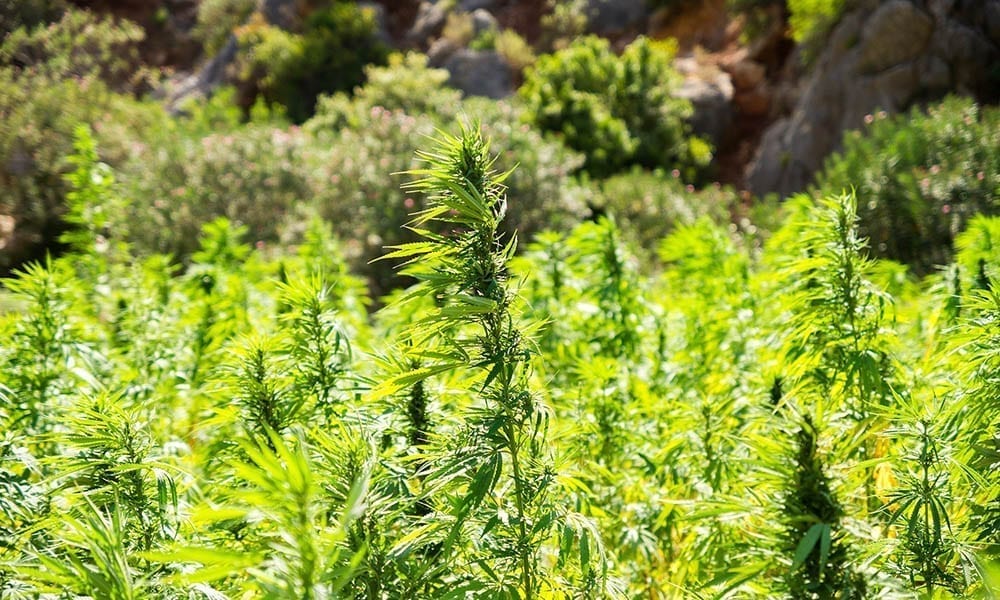Cultivation, Legal
Hemp Legalized in USA After Decades of Prohibition
By
This afternoon, President Donald Trump signed the 2018 Farm Bill into law. Hidden within the 807 pages of the massive spending bill, which primarily funds the nation’s food assistance program and subsidies for farmers, is an amendment to remove hemp from the Controlled Substances List and build a legal system around the plant. Thus, as of 4 p.m. EST on Dec. 20, full federal hemp legalization is now a reality in the United States for the first time in decades.
Standing next to Secretary of Agriculture Sonny Perdue and Vice President Mike Pence, Trump spoke primarily of his support for American farmers and did not mention that the bill would legalize hemp, though he did talk about criminal justice reform (and spoke at length about his proposed border wall).
But he didn’t need to shout out to the plant to make hemp legal, he just had to sign on the bottom line.
The hemp language in the 2018 Farm Bill is relatively succinct. The bill defines hemp as the Cannabis sativa L. plant and its derivatives and cannabinoids — so long as they contain less than 0.3 percent THC on a dry weight basis. Perhaps most significantly, this means that the much-hyped cannabinoid CBD will be no longer considered a Schedule I drug, on the single condition that the CBD itself is derived from hemp. (It’s worth noting there is no scientific difference between CBD isolate from hemp and CBD isolate from marijuana, if hemp is only defined as any cannabis plant with less than 0.3 percent THC.)
By removing hemp from the Controlled Substances List, the bill takes the hemp plant out of the jurisdiction of the Drug Enforcement Agency (DEA) and under the purview of the Department of Agriculture, which oversees the nation’s crops and food products. The Department of Agriculture will be in charge of writing the specifics of the regulations around the hemp plant, including how cultivators can get licensed, how testing will be conducted and what enforcement of the rules will look like. States and tribal governments will also have the ability to write their own restrictions and requirements for the hemp industry, though they are not allowed to interfere with interstate commerce.
“These changes represent a significant and long overdue shift in U.S. policy,” said Justin Strekal, the political director of NORML, in a statement. “Nonetheless, future regulatory efforts will likely still be required to address emerging consumer issues when it comes to the commercial sale and marketing of certain hemp-derived products, particularly so-called hemp-derived CBD extracts.”
Strekal noted that hemp legalization can help reign in the hemp-derived CBD products that have been encouraged by the lack of federal oversightto produce products “of variable and sometimes questionable quality and safety.”
“Now it is time for lawmakers to craft consistent benchmark safety and quality standards for hemp-derived CBD in order to increase consumer satisfaction and confidence as this nascent industry transitions into a legal marketplace,” he said.
Senate Majority Leader Mitch McConnell (R-KY), who played a leading role in ensuring hemp legalization’s passing, is responsible for the brief language of the hemp amendment. It was McConnell who introduced the hemp amendment to the Senate version of the 2018 Farm Bill back in early June. McConnell had been trying to get his Hemp Farming Act passedthrough the Senate, but decided to pivot and push the language of his bill into the Farm Bill for expediency.
McConnell shepherded his amendment through the complicated legislative process — through conference committees and final Senate votes — before signing the final bill with a hemp pen.
“We are at the beginning of a new era, and I cannot wait to see what comes next,” McConnell said in a statement after Trump signed the bill.
With the passage of the bill, hemp industry leaders celebrated their new ability to capitalize on the plant. Under the 2014 Farm Bill, states had been allowed to establish pilot programs for hemp cultivation. But those pilot programs still placed limits on the hemp industry, such as limiting access to banking, seeds, advertising platforms, interstate commerce and export markets.
“The Drug Enforcement Administration has no possible claim to interfere with the interstate commerce of hemp products,” said Jonathan Miller, general counsel for the U.S. Hemp Roundtable, which lobbied hard for the hemp legalization amendment in the 2018 Farm Bill. “This should give comfort to federally regulated institutions — banks, merchant services, credit card companies, e-commerce sites and advertising platforms — to engage in commerce with the hemp and hemp product industry. An exciting, emerging, multi-billion-dollar hemp industry will now be unleashed, providing economic opportunity to farmers and small businesses all across America.”
However, McConnell’s hemp amendment also includes a controversial ban that will lock many targets of the War on Drugs out of the legal hemp industry. The bill states that “any person convicted of a felony relating to a controlled substance under State or Federal law before, on, or after the date of enactment of this subtitle shall be ineligible, during the 10-year period following the date of the conviction.”
This means that a person who was charged with a felony for possessing a small amount of cannabis in Arizona last year would be unable to grow hemp under the new laws for another nine years. Given America’s past and present policies of policing communities of color disproportionately for drug crimes, this ban will perpetuate those racial disparities in the new industry.
“The application of this ban has distinctly discriminatory effects: black, brown and poor Americans are far more likely to receive harsher penalties than their white, wealthier counterparts for the same offenses involving controlled substances,” says cannabis attorney Cristina Buccola. “In no uncertain terms, this ban will have a disparate impact on already marginalized groups, and imbue a new industry with racist, classist and arbitrary barriers to entry.”
TELL US, are you excited for hemp legalization?
Read more from the source: CannabisNow.com


